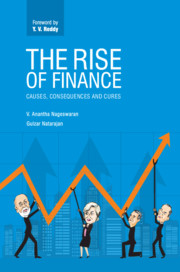Foreword
Published online by Cambridge University Press: 02 May 2019
Summary
The developments leading to the global financial crisis and experiences with policy responses have led to an inconclusive but fundamental rethinking on the practice of public policy. We know that the intellectual framework that prevailed before 2008 was not sustainable. We are yet to agree on what the new normal should be, except that money and finance are critical, though one part, and that excess finance is injurious to health. But right sizing finance cannot happen if the attention is confined to finance. We are in search of new balances not only between finance and real economy, but also between state and market, between national and global, and between old global economic order and evolving new one.
It is often argued that the ongoing financial crisis reflects excessive belief in the efficiency and self-correcting mechanisms of markets. It is, therefore, argued that the state should be empowered so that the balance between the state and the market is restored. Consequently, the policy prescriptions are essentially in the nature of creating a strengthened role for state, broadly defined to include intervention in the functioning of markets by the public policy.
It is possible to argue that the recent financial crisis represents the failure of both the market and the state. The apparatus of the state, in particular the independent central banks and regulators, seem to have failed to discharge the duties assigned and deliver the outcomes that they had assured. There are sufficient grounds to believe that the crisis is a result of the capture of the governments by the markets, especially by the financial institutions and financial markets. In other words, it can be argued that the crisis was caused by not a mere failure of regulators but a capture of the regulators and the governments by the financial markets. This plausible explanation of the crisis warrants an entirely different dimension to the traditional debate of state versus market. The debate may have to focus on the relationship between the state and the market in each country, on one hand, and the relationship between the nation states, national financial markets and international financial markets, on the other.
- Type
- Chapter
- Information
- The Rise of FinanceCauses, Consequences and Cures, pp. xi - xivPublisher: Cambridge University PressPrint publication year: 2019



